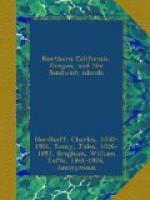The Indian shanties contain a fire-place, a bed-place, and sometimes a table; once I saw a small store-room; and on the walls hung dresses, shoes, fishing-nets, and other property of the occupants. The agent pointed out to me that in most of the houses there were bags of flour and meal stowed away, and remarked, “Whatever they may say against the President, no one can say that he does not make the Indians comfortable;” and it is true that I saw everywhere in the camp the evidence of abundant supplies of food and sufficient clothing in the possession of the Indians. The superintendent said to me, “They have plenty of every thing; they have often several bags of flour in the house at once; no man can say they are wronged.”
The earthen floors of the houses were usually cleanly swept; there are wells at which the people get water; the school-houses are well furnished, and as good as the average country-school, and the Indians seem to suffer no hardship of the merely physical kind. The agent, Mr. Burchard, seems to be a genuinely kind person, simple-hearted, and, I should think, honest; and his assistants, whom I saw, struck me as respectable men. Indeed, several persons in the valley, unconnected with the reservation, told me that under Mr. Burchard’s rule the Indians were much better treated than by his predecessor. I suppose, therefore, that I saw one of the most favorable examples of the reservation system.
In what follows, then, I criticise the reservation system, so far, at least, as it applies to the Indians of California, and not the management at Round Valley; and I say that it is a piece of cruel and stupid mismanagement and waste for which there is no excuse except in the ignorance of the President who continues it.
Most of the Indians of these northern coast counties, as well as those of Southern California, have for some years been a valuable laboring force for the farmers. They were employed to clear land, to make hay, and in many other avocations about the farm; they lived usually in little rancherias, or collections of huts, near the farm-houses; the women washed and did chores for the whites about the houses; and there has been, for at least half a dozen years, no pretense even that their presence among the whites was dangerous to these. Mr. Burchard told me himself that more than half the Indian men at Round Valley were competent farmers, and that the Indian women were used at the agency houses as servants, and made excellent and competent house-help.
Scattered through Potter, Little Lake, Ukiah, and other valleys, they were earning their living, and a number of farmers of that region have assured me that it was a serious disadvantage to them to lose the help of these Indians. Nor was it even necessary to speak their language in order to use their labor, for the agent told me that, of the Potter Valley tribe, nine-tenths speak English; of the Pitt Rivers, four-fifths; of the Little Lakes, two-thirds; of the Redwoods, three-quarters; of the Concows and Capellos, two-thirds. The Wylackies and Ukies speak less; they have been, I believe, longer on the reservation. As I walked through the Indian camp, English was as often spoken in my hearing as Indian.




